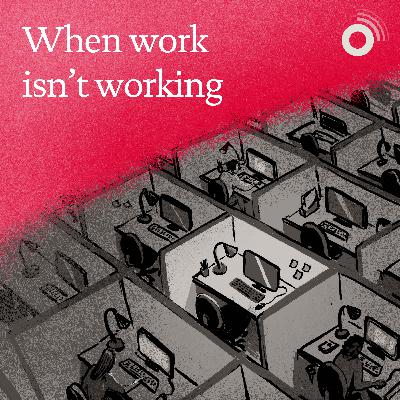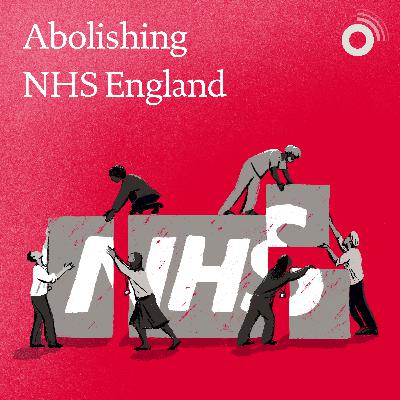Discover The Health Foundation podcast
The Health Foundation podcast

62 Episodes
Reverse
The year saw the arrival of the long-awaited 10-Year Health Plan – a dizzying array of proposals spanning NHS structures, services, staffing and more. Government missions were downgraded; another review of social care was announced; and further hopes pinned on the transformative potential of tech.
But how is progress overall? Is the government’s rhetoric on reform matching reality? And what should be at the top of government’s list of priorities in 2026?
To discuss, our Chief Executive, Jennifer Dixon, is joined by:
Rachel Sylvester, Political Editor of The Observer.
Hugh Alderwick, Director of Policy and Research at the Health Foundation.
Show notes
Health Foundation (2025). Dazed and confused? Policy ideas behind the 10-Year Health Plan.
Policy Exchange (2025). The NHS – a suitable case for treatment?
The Observer (2025). Poor families of babies brain-damaged at birth given lower payouts than richer parents.
UK government (2025). 10-Year Health Plan for England: fit for the future.
Health Foundation (2024). Is the grass really greener?
Health Foundation (2024). Priorities for an AI in health care strategy.
Health Foundation. Public perceptions of health and social care.
Times Health Commission (2024). Times Health Commission: A report into the state of healthcare in Britain today.
UK government (2024). Plan for change: Milestones for mission-led government.
How can AI be implemented safely and effectively? We look to the US for clues.
AI is going to have a huge impact on health and care. In England, the government’s 10-Year Health Plan aims to make the NHS ‘the most AI-enabled care system in the world’. But with AI innovations coming thick and fast, and the health technology market awash with unproven tools, how can implementation be done responsibly, ensuring patient safety, care quality and value for money?
The US leads the world in investment, development and implementation of AI in health services. So, what lessons can we learn from the American experience? What is the state’s role in regulating AI technologies in health; how can these innovations be robustly evaluated at speed; and how could AI be used to boost population health?
To discuss, our Chief Executive Jennifer Dixon is joined by:
Andrea Palm, former Deputy Secretary of the US Department of Health and Human Services (2021–25) where she led the development of the Department’s strategic plan for AI in health and care.
Andrew Bindman, Executive Vice President and Chief Medical Officer at Kaiser Permanente, one of the US’s largest integrated health care systems.
Show notes
Health Foundation (2025). Event: AI in the NHS 2025.
Health Foundation (2024). Priorities for an AI in health care strategy.
NEJM Catalyst (2024). Ambient AI scribes to alleviate burden of clinical documentation.
Kaiser Permanente (2025). AI in healthcare: 7 principles of responsible use.
We've seen real progress in cancer care in the UK: survival rates have doubled since the 1970s and death rates have fallen by around a fifth. But cancer still causes around 25% of all deaths today – and services are facing big challenges. Cancer survival in the UK lags other similar health systems, the rate of improvement in survival has slowed, and cancer cases are set to rise substantially over the coming decade.
25 years ago, Denmark had poor cancer outcomes compared with many European countries. Since then, bold policy action and investment has seen its cancer outcomes improve markedly, surpassing the UK. So as a new national cancer plan for England is developed, where should policymakers be focusing? And what can be learned from Denmark’s progress?
To discuss, our Chief Executive Dr Jennifer Dixon is joined by:
Michelle Mitchell, Chief Executive of Cancer Research UK
Jesper Fisker, Chief Executive of the Danish Cancer Society.
Show notes
Cancer Research UK (2025). Cancer in the UK – Overview 2025.
European Commission/OECD (2025). Country Cancer Profile – Denmark 2025.
Cancer Research UK (2024). Leading on Cancer: the case for dedicated strategy and leadership across the UK.
BBC (2025). What the NHS can learn from the European country that helped more people survive cancer.
OUP (2022). Successful Public Policy in the Nordic Countries – Cancer Treatment Policy in Denmark.
In our third conversation with former health secretaries, we speak to Sajid Javid about the future of the NHS and its long-term funding model. Sajid was Secretary of State for Health and Social Care from 2021 to 2022, before resigning from the Johnson government. He previously served in several cabinet positions, including as Home Secretary and Chancellor. He stepped down as an MP in 2024.
In conversation with our Chief Executive Jennifer Dixon, Sajid reflects on the challenges facing the NHS and why he believes it’s time to consider alternative ways of funding health care. But what does the evidence about comparable health systems tell us? What are the strengths and weaknesses of social insurance systems? And how can consensus be built on a sustainable funding mix for the NHS in future?
Show notes
Policy Exchange (2025). The NHS – a suitable case for treatment?
Sajid Javid (2023). We need to agree a new NHS future or 1948 dream dies.
OECD (2025). How do health system features influence health system performance?
RAND Corporation (2006). The Health Insurance Experiment.
Health Foundation (2024). Is the grass really greener?
Is the government’s 10-Year Health Plan the medicine the NHS needs? We ask two former health secretaries.
In the second of two special episodes, we speak to Alan Milburn about the future of the NHS and his thoughts on the government’s 10-Year Health Plan. Alan was Secretary of State for Health from 1999 to 2003, during the Blair governments, with his tenure seeing the development of the NHS Plan (2000) and record levels of investment. As Lead Non-Executive Director at the Department of Health and Social Care, Alan also had a hand in writing and developing the new plan.
In conversation with our Chief Executive Jennifer Dixon, Alan reflects on the key challenges facing the NHS today and why he believes the new plan sets the right direction of travel. But is the plan clear enough about how change will be delivered? How will the plan ensure the health service pulls in one direction across varying objectives and programmes? And will the pace of change be sufficient by the time of the next election?
Show notes
The Health Foundation (2020). Glaziers and window breakers. Former health secretaries in their own words.
The Health Foundation (2025). Jeremy Hunt on the 10-Year Health Plan.
The Health Foundation (2025). 10-year ‘Plan for Change’ or ‘plus ça change’?
The Health Foundation (2025). Neighbourhood health is the right ambition – but will the 10-year plan deliver?
The Health Foundation (2025). Dazed and confused? Policy ideas behind the 10-Year Health Plan.
Is the government’s 10-Year Health Plan the medicine the NHS needs? We ask two former health secretaries.
In the first of two special episodes, we speak to Jeremy Hunt about the state of the NHS and his reaction to the government’s 10-Year Health Plan. Jeremy was Secretary of State for Health and Social Care between 2012 and 2018, in the Cameron and May governments, making him the longest serving health secretary to date. He later served as foreign secretary (2018–2019) and Chancellor of the Exchequer (2022–2024).
In conversation with our Chief Executive Jennifer Dixon, Jeremy reflects on his time as health secretary and whether he believes the new plan presents a coherent blueprint for reform. Does the plan strike a positive balance between top-down targets and decentralisation? Will the decision to scrap NHS England and cut the numbers of ICBs help or hinder delivery? And what is the future role of regulation in improving patient safety and care quality?
Show notes
The Health Foundation (2020). Glaziers and window breakers. Former health secretaries in their own words.
Nuffield Trust (2025). Exploring earnings of NHS doctors in England.
The Health Foundation (2025). Taking a chainsaw to NHS England is not the sign of a healthy state.
HSJ (2025). Cuts to ICBs and NHSE slammed by ex-health secretary.
HSJ (2025). Patient Safety Watch: Dash Review opens a crucial door.
BMJ (2025). Government’s 10 year plan for the NHS in England.
Our surroundings play a big role in shaping our health. And some neighbourhoods – including so-called ‘left behind areas’ – can be tough places to live, with limited economic opportunity, low levels of social mobility and social capital, and poorer health. All this contributes to people in the most deprived areas on average living 19 fewer years in good health than people in the least deprived.
The government is pursuing a range of initiatives to boost the fortunes of deprived neighbourhoods, including a national plan for neighbourhoods, extending devolution and directing more infrastructure investment towards struggling areas. But has government understood the value of social capital in rebuilding communities? What are the lessons of past government initiatives focused on neighbourhood renewal and left behind communities? And can the concept of ‘neighbourhood health’ help to improve health and reduce entrenched inequalities?
To discuss, our Chief Executive Dr Jennifer Dixon is joined by:
Hilary Armstrong, Chair of the Independent Commission on Neighbourhoods (ICON), and former New Labour cabinet minister and MP for North West Durham.
Andrew O’Brien, Head of Secretariat at ICON.
Show notes
ICON (2025). ICON’s Neighbourhood Policy Green Paper – Delivering Neighbourhood Renewal: Proposals for Change.
ICON (2025). Anatomy of mission critical neighbourhoods.
Ministry of Housing, Communities and Local Government (2025). Plan for Neighbourhoods.
Ministry of Housing, Communities and Local Government (2025). Trailblazer neighbourhoods.
Collier P (2024). Left Behind: A New Economics for Neglected Places.
Health Foundation (2024). Sure Start: a model for long-term policymaking? – with Naomi Eisenstadt and Donna Molloy.
Health Foundation (2021). The government’s levelling up agenda: An opportunity to improve health in England.
8.2 million working-age people report having a long-term health condition that limits their ability to work. 1.7 million say that work itself is making them ill or creating challenges. In addition to causing personal hardships, this decline in working-age health is causing concern among employers, politicians and policymakers.
With the benefits bill rising, government has set its sights on wide-ranging welfare reforms, including significant changes to health and disability benefits. Are these reforms likely to incentivise and support people back into work? And how can the system intervene earlier and support employers to provide people with the flexibility they need to stay in work in the first place?
To discuss, our Chief Executive Jennifer Dixon is joined by:
Jon Ashworth, Chief Executive of Labour Together and former shadow Secretary of State for Health and Social Care and for Work and Pensions.
Sacha Romanovitch, Chair of the Commission for Healthier Working Lives, which is supported by the Health Foundation.
Show notes
Commission for Healthier Working Lives (2025). Action for healthier working lives.
UK government (2025). Pathways to Work: Reforming Benefits and Support to Get Britain Working Green Paper.
Barnsley Metropolitan Borough Council (2024). Pathways to Work Commission.
Health Foundation (2025). Will short-term fixes undermine building a healthier workforce in the long run?
Financial Times (2025). How to keep sick people in employment.
Health Foundation (2025). Mental health trends among working-age people.
‘Today we are abolishing the biggest quango in the world,’ – Wes Streeting, 13 March 2025
Many people were surprised by the government’s decision to abolish NHS England and fold its functions into the Department of Health and Social Care. Not least Richard Meddings, Chair of NHS England since 2022. Having formally completed his term in March, Richard joins our Chief Executive Jennifer Dixon to discuss.
In a wide-ranging conversation, Richard reflects on his time at NHS England and how the organisation has changed. With the NHS facing growing demand for care, and continuing to top the public’s list of priorities, where does the forthcoming 10-year health plan need to focus? How should ministers lead the service in the future? And what needs to happen to ensure the NHS reaches its 100th year?
Show notes
The Health Foundation (2020). Glaziers and window breakers. Former health secretaries in their own words.
OECD (2025). How do health system features influence health system performance?
Department of Health and Social Care (2023). The Hewitt Review: an independent review of integrated care systems.
The Health Foundation (2025). Taking a chainsaw to NHS England is not the sign of a healthy state.
The Health Foundation (2025). Labour’s 10-year plan for the NHS in England: what should it look like?
NHS England (2025). Review of NHS performance and delivery (27 March 2025). NHS England board meeting.
It’s 2 years since Keir Starmer first set out his five missions for government, including a health mission to build ‘an NHS fit for the future’ and ‘a fairer Britain, where everyone lives well for longer’. Missions were supposed to mean a new way of doing government – focused on ambitious, long-term objectives that provide a driving sense of purpose for the country.
So, with Labour now in office for 9 months, what have we learned about how mission-driven government works in practice? Are clues emerging about how government plans to improve the nation’s health beyond the confines of the NHS? And do missions show signs of bringing about durable changes in policy and how the state works?
To discuss, our Chief Executive Jennifer Dixon is joined by:
Hannah White, Director at the Institute for Government.
Jo Bibby, Director of Health at the Health Foundation.
Show notes
Institute for Government (2025). Inside Briefing. Keir Starmer rewires the state.
Institute for Government (2024). What does a mission-driven approach to government mean and how can it be delivered?
Health Foundation (2024). Health at the heart of government.
UK Government (2024). Plan for change: Milestones for mission-led government.
Future Governance Forum (2024). Mission-critical: statecraft for the 21st century.
There are around 350,000 synthetic chemicals in use today and only a small fraction have been robustly tested for their long-term effects on our health. Many of these are used in manufacturing plastics and microplastics – the production of which has doubled since 2008 and is projected to triple by 2060.
Unknowns remain, but research is suggesting pervasive exposures to these manufactured substances is shaping human health. In particular, links are being identified with a range of non-communicable diseases, including some cancer types, metabolic disorders, neurological conditions and reproductive and developmental issues.
So, what do we know about how the chemical environment is influencing our health? Could AI and other emerging technologies shed new light on the effects of synthetic substances? And what does it all mean for regulation and wider policy protecting public health?
To discuss, our Chief Executive Jennifer Dixon is joined by:
Tracey Woodruff, Professor at University of California, San Francisco, and Director of the Program on Reproductive Health and the Environment (PRHE).
Thomas Hartung, Professor at Johns Hopkins University, and Director of the Centre for Alternatives to Animal Testing (CAAT).
Show notes
Woodruff et al (2025). Manufactured chemicals and children’s health – the need for new law.
Kleinstreuer & Hartung (2024). AI – it’s the end of tox as we know it (and I feel fine).
Nihart et al (2025). Bioaccumulation of microplastics in decedent human brains.
Financial Times (2023). ‘Global sperm counts are falling. This scientist believes she knows why.’
Programme on Reproductive Health and the Environment (PRHE). Scientific principles to protect public health.
Programme on Reproductive Health and the Environment (PRHE). Toxic matters.
There’s been no shortage of NHS plans over the years – what needs to be different this time?
Health and care services are facing acute pressures and the NHS tops the public’s list of priorities. The government has pledged to ‘reimagine’ the NHS via a 10-year plan, expected in the spring.
The pressure is now on to develop a credible reform plan. It will need to address the huge challenges of changing health care needs and capitalise on the opportunities ahead, including those stemming from new technologies. All within a challenging fiscal context.
So what needs to be in the plan on key priorities – primary care, community services, and improving hospital services? What are the lessons from past NHS plans? And how can policymakers bring front-line staff with them and provide hope their working lives will improve?
To discuss, our Chief Executive Jennifer Dixon is joined by:
Nigel Edwards, former Chief Executive of the Nuffield Trust.
Hugh Alderwick, Director of Policy at the Health Foundation.
Show notes
The Health Foundation (2024). Public perceptions of health and social care: five findings the new government should know.
The Health Foundation (2024). The public’s views on the future of the NHS in England.
Nigel Edwards. The Nuffield Trust (2018). Avoiding groundhog day: learning the lessons of NHS reforms.
The Health Foundation (2025). Health Foundation response to consultation on 10-year health plan.
The Health Foundation. Policy Navigator – NHS reform.
We look back at our pick of the pod from 2024.
As 2024 draws to a close, what to make of the year’s developments in health and care?
As yet, a murky picture on NHS reform and on how the new Labour government’s five missions will work in practice; a pressing need to improve the health of the working-age population; and some promising ways forward for technology to improve care, quality and productivity in the NHS.
In this episode, we also revisit how to drive the economic growth we need to fund high-quality public services, search for clues about what might be behind the worrying rise in cancer rates among younger adults, and explore what the latest evidence tells us about inequalities in health across ethnic groups in the UK.
This episode also marks our 50th – meaning there’s a great back catalogue for you to enjoy. Join our Chief Executive Dr Jennifer Dixon as we reflect with guests who appeared on the podcast in 2024.
All-time top performing episodes
Health Foundation (2020). Low life expectancy in Glasgow, and what to do about it.
Health Foundation (2021). Inside the teen mind: what’s happening to mental health?
Health Foundation (2020). What should nanny do next? The government and obesity.
Health Foundation (2023). AI in health care: hope or hype?
Health Foundation (2021). We are what we eat: food, health and inequality.
Show notes
John Burn-Murdoch (2024). What if the UK isn’t actually the sick man of Europe? Financial Times.
Barnsley MBC (2024). Pathways to Work: Commission Report.
Edwards & Dayan (2024). Leagues tables for the NHS.
Health secretary Wes Streeting has set out three big shifts the NHS must deliver – including moving from analogue to digital. National strategy on health technology and digital is developing at pace, with a 10-Year Plan for the NHS expected to set out new priorities in the spring.
We’ve seen no shortage of initiatives, roadmaps and plans for tech and innovation in recent years – yet delivery has often lagged behind. Today, acute pressures on health and care services, demographic headwinds and trends in disease burden mean there’s an imperative to deliver at pace. Much recent attention has focused on AI and its revolutionary potential, but leveraging this depends on a range of other digital capabilities that not all NHS trusts and services have.
So, where is the NHS on its journey to digitisation? And, given all of this, what will it take for the NHS to become a truly digital health system?
To discuss, our Chief Executive Jennifer Dixon is joined by:
Holly Krelle, Assistant Director at the Center for Healthcare Innovation & Delivery Science at New York University's Langone Medical Center.
Erik Mayer, Consultant Surgeon at Imperial College Healthcare and the Royal Marsden NHS trusts, and Director of Imperial's clinical analytics unit.
Show notes
Darzi et al (2024). Independent investigation of the NHS in England.
The Health Foundation (2025). Briefing on digital maturity in the NHS [forthcoming].
The Health Foundation (2023). What do technology and AI mean for the future of work in health care?
Horwitz & Krelle (2023). Using rapid randomised trials to improve health care systems. Annual Review of Public Health.
Honeyford et al (2022). Challenges and recommendations for high quality research using EHRs. Frontiers in Digital Health.
NHS Confederation (2024). Frontline digitisation: creating the conditions for a digital NHS.
Dearing & Cox (2018). Diffusion of innovations theory, principles and practice. Health Affairs.
The UK is becoming more ethnically diverse: nearly 20% of the population reports being from a minority ethnic background and projections suggest growing diversity is the future. People from minority backgrounds in the UK experience a variety of inequalities. But what is the latest evidence telling us?
A comprehensive analysis of race and ethnicity, recently published as part of The IFS Deaton Review of inequality, finds no single story of advantage or disadvantage across ethnicities. Instead, it presents a complex picture of inequality across and within ethnic minority groups. The findings highlight entrenched inequalities – including access to the building blocks of health such as a good education, stable employment, secure housing and fair pay.
So what do we know about the groups that experience inequalities, what drives these – and how do they relate to health? And what do policymakers need to understand to respond effectively?
To discuss, our Chief Executive Jennifer Dixon is joined by:
Heidi Safia Mirza, Emeritus Professor of Equalities Studies in Education at IOE (UCL Institute of Education) and co-author of the race and ethnic inequalities chapter of the Deaton Review.
Shabna Begum, Chief Executive Officer, Runnymede Trust, a charitable think tank working to reduce racial inequality in the UK.
Show notes
Oxford Open Economics (2024). Dimensions of Inequality: The IFS Deaton Review.
Mirza H S, Warwick R (2024). Race and ethnic inequalities.
Runnymede Trust (2022). Broken Ladders.
Runnymede Trust (2020). Colour of Money.
The King’s Fund (2023). The health of people from ethnic minority groups in England.
Runnymede Trust (2024). Health Foundation supported report on ethnic inequalities and the wider determinants of health. (Forthcoming.)
Since the early 1990s, there’s been a concerning uptick in cancer incidence among adults younger than 50 years.
Scientists are racing to understand what’s driving these trends. Some evidence points to roles for established risk factors – including smoking and obesity. But some research is also exploring environmental exposures – such as microplastics and forever chemicals – and asking if these could be changing the microbiome and potentially causing inflammation within the body.
So what do these trends mean for cancer research, for health services and national policy? And faced with such stark trends, where are there grounds for hope?
To discuss, our Chief Executive Jennifer Dixon is joined by:
Kimmie Ng, specialist in oncology and Director of the Young-Onset Colorectal Cancer Centre at the Dana Farber Cancer Institute in Boston, and Associate Professor of Medicine at Harvard Medical School.
Charles Swanton, Deputy Clinical Director at Francis Crick Institute, Chief Clinician at Cancer Research UK, and a consultant oncologist at University College London Hospitals NHS Foundation Trust.
Show notes
Nature Reviews Clinical Oncology (2022). Is early-onset cancer an emerging global epidemic? Current evidence and future implications.
BMJ Oncology (2023). Global trends in incidence, death, burden and risk factors of early-onset cancer from 1990 to 2019.
Gupta S et al (2023). Birth Cohort Colorectal Cancer (CRC): Implications for research and practice.
Financial Times (2023). The unexplained rise of cancer among millennials.The New England Journal of Medicine (2024). Microplastics and nanoplastics in atheromas and cardiovascular events.
Cancer Grand Challenges. Team OPTIMISTICC: Opportunity to investigate the microbiome’s impact on science and treatment in colorectal cancer.
The Health Foundation (2023). How chronic stress weathers our health.
The Health Foundation (2024). Rising cancer incidence in younger adults: what is going on? (Forthcoming)
There’s a new Prime Minister in Downing Street and a new political reality in the UK. But what does it all mean for health and care? The incoming government faces a range of complex policy challenges – many of them linked to health and care – and a daunting fiscal inheritance.
While the public might show patience for a few months, they will expect to see some results quickly – and health is a top priority for voters. So how is the new government going to navigate these tensions? What will being ‘mission-led’ mean in practice? And where is the money going to come from?
To discuss, our Chief Executive Jennifer Dixon is joined by:
Hannah White, Director and CEO of the Institute for Government.
John McTernan, Senior Adviser at BCW Global. John was formerly director of political operations for the Labour government from 2005 to 2007.
As the general election approaches, what are the main parties planning on health and will it make a difference?
Polling day is rapidly approaching and all the main party manifestos have now been published. But when it comes to health and care, do we know what we’re voting for? Many commentators have expressed deep frustration at the opacity of the political debate – not just about the state we are in, but on the plans to get out of it.
This matters because whoever wins the election faces a daunting series of challenges. Not least cratering public satisfaction with NHS services, an elective care waiting list standing at 7.6 million, rising levels of ill health among working-age people, and an economy growing too slowly to support the funding and investment public services will require.
So what are the main parties promising on health, are their pledges in tune with the public mood, and are their plans equal to the scale of the challenges?
To discuss, our Chief Executive Jennifer Dixon is joined by:
Sam Freedman, Senior Fellow at the Institute for Government and former Senior Policy Adviser to Michael Gove at the Department for Education.
Paul Corrigan, Management Consultant and former Special Adviser to Alan Milburn and Tony Blair under New Labour. Paul is currently advising the Labour Party on health policy.
Show notes
The Health Foundation (2024). General election 2024 collection.
The Health Foundation (2024). What's in the party manifestos on health and care?
The Health Foundation (2024). Do the manifestos cut it on health?
Institute For Government (2023). The NHS productivity puzzle: Why has hospital activity not increased in line with funding and staffing?
Institute For Government and CIPFA (2023). Performance Tracker 2023: Hospitals.
Timmins, N (2021). The Health Foundation. The most expensive breakfast in history: revisiting the Wanless review 20 years on. The Health Foundation.
More long-term, mission-led policymaking is sorely needed, but how best to do it?
The Sure Start programme was set up with the aim of giving young children the best possible start in life, narrowing gaps in outcomes for disadvantaged children. First announced by the New Labour government in 1998, it has evolved regularly over the past two decades. Recent evaluations have found early versions of Sure Start delivered positive impacts for children – supporting improved educational attainment, employment outcomes and long-term health.
So what lessons does Sure Start hold for long-term policymaking? How can national policymakers drive long-term change in social outcomes, what pitfalls need to be avoided, and where should any new government be looking if they want to improve children’s lives and health today?
To discuss, our Chief Executive Jennifer Dixon is joined by:
Naomi Eisenstadt, former director for Sure Start and current Chair of Northamptonshire integrated care board (ICB).
Donna Molloy, Deputy Chief Executive at Foundations – What Works Centre for Children & Families.
Show notes
IFS (2021). The health impacts of Sure Start.
IFS (2024). The short- and medium-term impacts of Sure Start on educational outcomes.
Eisenstadt (2022). Sure Start Review, The Therapeutic Journal.
The Health Foundation (2024). Sure Start shows that to improve health, governments must keep the faith (blog).
Molloy & Asmussen (2021). Worth the wait: new evaluation data shows positive impacts of Family Nurse Partnership, EIF/WWCSC
Hadley et al (2016). Implementing the UK's teenage pregnancy strategy for England. Reproductive Health.
Improving NHS productivity is a key national priority. But what’s behind the slowdown and can it be reversed?
Over the past few years, amid the turmoil of COVID-19, the NHS has seen substantial growth in funding and clinical staffing levels. Yet the numbers of patients treated haven’t risen in step – suggesting services, particularly NHS acute hospitals, have become less productive.
Government has announced a wide-ranging review of public sector productivity and asked services to develop plans to recover productivity performance. At the Spring Budget 2024, £3.4bn in capital funding was announced to support digital and technology projects intended to boost NHS productivity.
So why have activity levels not been keeping pace with recent increases in NHS funding and staffing, what can be done, and is implementing new technologies a solution worth banking on?
To discuss, our Chief Executive Jennifer Dixon is joined by:
Anita Charlesworth, Chief Economist and Director of the REAL Centre at the Health Foundation.
Neil Sebire, Professor of Pathology and Chief Research Information Officer at Great Ormond Street Hospital for Children NHS Foundation Trust.
Show notes
Institute for Government (2023). The NHS productivity puzzle.
Institute for Fiscal Studies (2023). Is there really an NHS productivity crisis?
Health Foundation (2023). The unsustainable is not sustained: why productivity is fundamental to the future of the NHS.
Bennett Institute (2021). Productivity in UK healthcare during and after COVID-19 pandemic.
Chancellor’s speech on productivity growth (2023).
Centre for Health Economics (2024). Productivity of the English National Health Service: 2021/22 update.
























